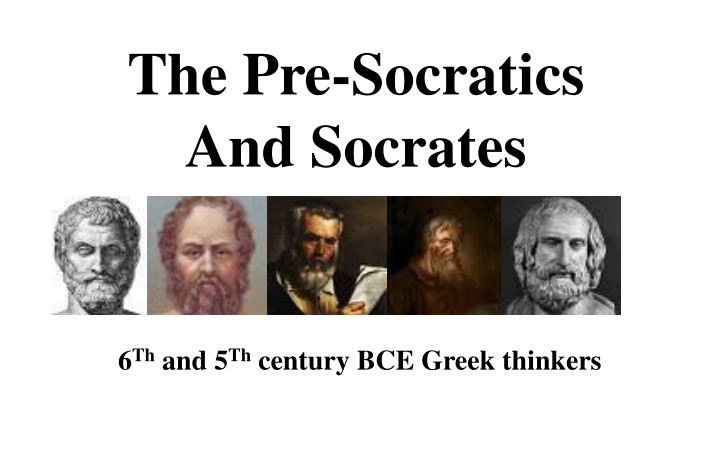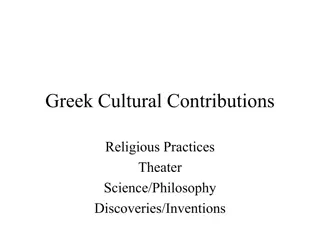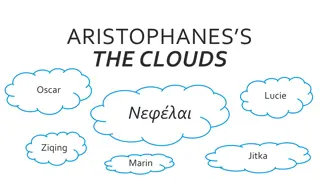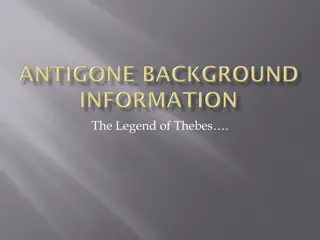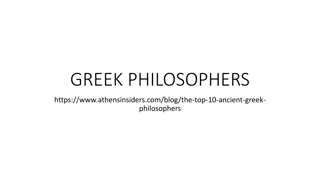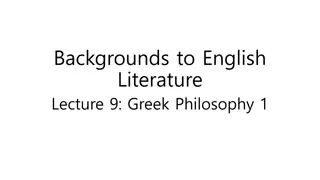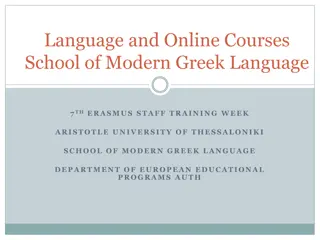Early Greek Philosophers: Pre-Socratics and Socrates
Ancient Greek thinkers like Thales of Miletus laid the foundation for Western philosophy by moving beyond mythology to explore the principles of the natural world. Socrates, a pivotal figure, introduced new ways of thought. This era marked a shift towards critical thinking and rational inquiry, shaping the course of philosophy for centuries to come.
Download Presentation

Please find below an Image/Link to download the presentation.
The content on the website is provided AS IS for your information and personal use only. It may not be sold, licensed, or shared on other websites without obtaining consent from the author.If you encounter any issues during the download, it is possible that the publisher has removed the file from their server.
You are allowed to download the files provided on this website for personal or commercial use, subject to the condition that they are used lawfully. All files are the property of their respective owners.
The content on the website is provided AS IS for your information and personal use only. It may not be sold, licensed, or shared on other websites without obtaining consent from the author.
E N D
Presentation Transcript
The Pre-Socratics And Socrates 6Th and 5Th century BCE Greek thinkers
http://upload.wikimedia.org/wikipedia/commons/thumb/2/28/Levant.gif/300px-Levant.gifhttp://upload.wikimedia.org/wikipedia/commons/thumb/2/28/Levant.gif/300px-Levant.gif Early civilizations Began in the Fertile Crescent region of southwest Asia. The emergence of civilization is associated with Agricultural Revolution occurred in various locations between 8,000 and 5,000 BCE.
Philosophy Timeline Birth of Christ 8000 BCE 5000 BCE Present 600 BCE 1945-50 600 CE 1500 CE Civilization begins (?) Modern Philosophy Begins Post-Modern Philosophy Ancient Philosophy Modern Philosophy Philosophy Begins Medieval Philosophy
*Why were pre-Socratics? Socrates is such an important figure in Western philosophy that we divide ancient philosophy into classical and pre-Socratic philosophers. Socrates lived c. 469 BC 399 BC Presocratics introduced a new way of thinking about the world: They went beyond Greek mythology.
Thales of Miletus (624-546 B.C.E) A witty maid-servant saw Thales tumbling into a well and said that he was so eager to know what was going on in heaven that he could not see what was before his feet. First who studied astronomy. Foretold the eclipses and motions of the sun in 585. Divided the year into 365 days. Measured pyramids by watching their shadows. Landmass ends at water s edge; so, earth is floating on water. Main doctrine: He asserted water to be the principle of all things:
Thales was poor, so people believed the study of philosophy was useless. Through his knowledge of astronomy, Thales perceived that there would be a large harvest of olives that year. While it was still winter, he put deposits on all the olive oil businesses. He obtained them at a low price. When the season came for making oil, many people wanted the rights, and he sold them all at once for whatever terms he pleased; raising a large sum of money, he convinced everyone that it was easy for philosophers to be rich if they chose it, but that was not what they aimed at. [Aristotle, Politics, 1.11]
Thaless Doctrine According to Aristotle [Politics, 1.11] Thales said the principle is water (for which reason he declared that the earth rests on water). Perhaps he got this notion from seeing that the nutrition of all things is moist, and that heat itself is generated from the moist and kept alive by it (and that from which they come to be is a principle of all things). Perhaps he also got his notion from the fact that the seeds of all things have a moist nature, and that water is the origin of the nature of moist things.
Thales thought that reality is composed of only one thing, with all different things that we experience being nothing but various forms of water. The task of metaphysics is to identify the primary substance and to equate it with reality.
Since what we perceive through the senses is not one thing, but many, Thales thought that reality could be known by reasoning about it. By approaching it through intellectual knowledge, not sense perception.
Thales had in mind the distinction between appearances and reality. The commonsense world known through the senses appears to be very different from the real world, known through the mind. What is real is different from what appears to my senses to be real.
Thales introduced this new philosophical way of thinking about the world, a way that replaced mythological thinking.
Anaximander (c. 610 c. 546 BC) Student of Thales. Invented the sundial, he also made clocks. First to draw a map of the earth. Earth cannot float on water. Where does water float on? He argued that the force of opposites held it there. the Unlimited is not itself a particular kind of thing, like water. The principle and primary element of all things was the Unlimited or boundless
Anaximander is the first of the Greeks to write his ideas The boundless is the original material of existing things; further, the source from which existing things derive their existence is also that to which they return at their destruction, according to necessity.
According to Aristotle [Physics, 3.3] There is a body distinct from the elements, the boundless, which is not air or water, in order that the other things may not be destroyed by their infinity. The elements are in opposition to each other: air is cold, water moist, and fire hot. Therefore, if any one of them were infinite, the rest would have ceased to be by this time. Thus, he said that what is infinite is something other than the elements, and from it the elements arise.
He argued that the basic stuff of reality is the Unlimited . For Anaximander everything originates from and dissolves into the Unlimited. Every change involves a conflict of opposites. He held a primitive theory of evolution to account for how the many kinds of things that now exist evolved from the unlimited. Anaximander s mysterious concept of the Unlimited uncannily resembles our contemporary notion of energy .
Furthermore, Anaximander argued that the earth does not rest on a vast ocean of water, as Thales held, and as many believed to be true at that time. Instead, he believed that it hangs suspended at the center of the universe by the force of opposites.
Anaximenes (b. 585 BCE, d. 528 BCE) Student of Anaximander Dismissed the theory of Anaximander: earth must be supported by something by air. Said that the principle of everything was the air, As our souls, being air, hold us together, so breath and air embrace the entire universe. Disagrees with Thales that water is the ultimate basis of reality. Does not agree with Anaximander that the source of all things can be some vague, poetic entity such as the Unlimited. Air is all around us. It is necessary for life to breathe it. It fills the sky, and upon it floats the earth. He said the three elements, earth, fire and water, arose from the air: condensation and rarefaction. Pure air is the most rarefied substance, but it can condense into heavier and heavier forms. according to degree of condensation fire, wind, clouds, water, and earth are formed.
Pythagoras (582-496 BCE) Wrote books on Education, on Politics, and on Natural Philosophy. Discovered that the square of the hypotenuse of a right-angled triangle is equal to the squares of the sides containing the right angle. Introduced the idea of square and cube of a number. That the soul is something different from life and is immortal. That the soul of man is divided into three parts: intuition, reason , and mind. The nature of reality is constituted by numbers/proportions/mathematical relations.
Two types of mathematical ratios were especially important for Pythagoras: the Tetractys and musical harmony. The Tetractys is a mystical symbol involving ten points arranged in four rows: one, two, three, and four points in each row respectively: * ** *** **** The four rows represent earth, air, fire and water, and various combinations of the points generate important numbers and ratios.
The Tetractys represents the harmony and organization of the cosmos. Harmony is a system of three intervals: the fourth, the fifth, and the octave. The proportions of these three intervals are found in the four numbers The relationships between musical notes-harmony, may be expressed numerically. an octave is the interval between one musical pitch and another with double its frequency. A fifth is an interval corresponding to a pair of pitches with a frequency ratio of 3:2 A fourth is an interval of frequency ration of 4:3
Mathematics is the keys to unlocking the secrets of reality. For Pythagoreans, reality is number. Number is the ruling and self-creating bond which maintains the everlasting stability of the things that compose the universe. Pythagoras said that the soul is immortal, and it changes into other kinds of animals. The things that happen recur at certain intervals, and nothing is new. All things that come to be alive are akin.
http://ts2.mm.bing.net/images/thumbnail.aspx?q=4815616745668685id=c0d8ddab5a4671a4aa7d067c025edc53http://ts2.mm.bing.net/images/thumbnail.aspx?q=4815616745668685id=c0d8ddab5a4671a4aa7d067c025edc53 Heraclitus (535-475 BCE) Everything is constantly changing; nothing is permanent. Everything is a coming together of opposites: the path up to the mountain and the path down are the same path; the young you and the old you are the same you. Everything flows on like a river everything is a flux. "You can't step into the same river twice . Identified reality with fire. There is exchange of all things for fire and of fire for all things Change is the law of life, and there is nothing definite in the universe. This universe, which is the same for all, has not been made by any god or man, but it always has been, is, and will be an ever-living fire, kindling itself by regular measures and going out by regular measures. Everything flows and nothing abides; everything gives new way and nothing stays fixed.
For Heraclitus there is nothing permanent. You cannot step into the same river, for other waters and yet others go ever flowing on. In another curious passage he appears to identify reality with one of the four elements, fire. There is exchange of all things for fire and of fire for all things, as there is of wares for gold and gold for wares.
At the deepest core of reality is a creative process, a synthesis of opposing elements, where cool things become warm, the warm grows cool; the moist dries, the parched becomes moist. This process gives rise to change fire from earth, air from fire, water from air and earth from water. Heraclitus calls this pattern the Logos, the rational order of the cosmos.
Parmenides of Elea (510-440 BCE) Nothing changes, everything is permanent, everything is Being. If what is real, Being, is what can be thought or said, and if not- being cannot be thought or said, then reality is only Being. There is no not-being. Being is eternal. It was not created nor can it be destroyed. Everything that Is did not become what it is, for then it would have had to not-be before it was. Nothing comes out of nothing: everything must always have existed. Being is One Reality must be/universe must be one single unchanging entity. When we experience change is because it occurs within an unchanging system. It is a fixed and frozen unity, always has been, and always will be that way.
Parmenides said nothing changes, that everything is permanent, that everything is what he called Being. Things change their location (motion) or change from one sort of thing to another (wood becomes heat and ashes when burned) or change a property (a banana changes color from green to yellow).
Parmenides drew the distinction between appearances ( mere seeming ). On the one hand, there are the senses that that produce opinion. On the other hand, we have our minds that deliver reality to us. For Parmenides, All is One and One is all (Being).
Being is eternal. It was not created, nor can it be destroyed. It simply is. It has no beginning because if it did, Being would have to come from not-being. So, everything that is did not become what it is, for then it would have to exist before it came into existence. Not So Being just is, eternally.
Being is indestructible. It cannot cease to be because, again, it would have to pass from Being to not-being. I know you re thinking, that coming to be and passing away are real. An apple is eaten and changes to human flesh. None of this really happens, says Parmenides; it appears to the senses that it does. Change is a mere illusion. It is what the senses tell us about the world.
Parmenides claims that Being is indivisible. It cannot be divided into parts that can be named. There are no separate kinds of things. If it had parts, it would have divisions, and divisions are not-being, or nothing. Divisions are the holes between beings and thus, do not exist.
Zeno of Elea (490-430 BCE) Zeno's paradoxes are a set of philosophical problems to support his teacher s, Parmenides, doctrine that "all is one" and that, contrary to the evidence of our senses, the belief in plurality and change is mistaken. motion is illusory.
The paradox of the stadium runner: Imagine that a runner sets off on a racetrack. Before he can reach the finish line, he must pass the halfway point. Before he can do that, though, he must pass the 1/4- way point, and before that the 1/8-way point, and so on to infinity. The runner would have to cross an infinite number of way points in a finite time, and thus can never reach his goal.
Anaxagoras (500-428 BCE) that the sun was a mass of burning iron, greater than Peloponnesus, and that the moon contained houses, and also hills and ravines The winds he thought were caused by the rarification of the atmosphere, which was produced by the sun. Thunder, he said, was produced by the collision of the clouds; and lightning by the rubbing together of the clouds. Earthquakes were produced by the return of the air into the earth. All animals he considered were originally generated out of moisture, and heat, and earthy particles: and subsequently from one another. It is said that he was persecuted for impiety because he said that the sun was a fiery ball of iron. the world is comprised of infinitely divisible portions of elements that are set in motion by a cosmic Mind.
Leucippus (c550 BCE) Democritus (460-370 BCE) his principal doctrines were, that all things were infinite, and were interchanged with one another. that the universe was a vacuum, and full of bodies; also that the worlds were produced by bodies falling into the vacuum. that the nature of the stars originated in motion. he was the first philosopher who spoke of atoms as principles.
Here is how Aristotle described his theory: According to the theory of Democritus it is the nature of the eternal objects to be tiny substances infinite in number. Accordingly, he postulates also a place for them that is infinite in magnitude, which he designates by these names the void, the nothing and the infinite; whereas he speaks of each individual atom as the yes-thing, the dense, and being. He conceives them as so small as to elude our senses, but as having all sorts of forms, shapes, and different sizes. Treating these as elements, he conceives of them as combining to produce visible and otherwise perceptible objects.
Protagoras (481-420 BCE) In every question there were two sides to the argument exactly opposite to one another: "Man is the measure of all things Concerning the Gods, I am not able to know to a certainty whether they exist or whether they do not. For there are many things which prevent one from knowing, especially the obscurity of the subject, and the shortness of the life of man. he was banished by the Athenians. And his books were burnt in the market-place. Instituted contests of argument and charged money to teach how to win arguments. (sophism).
Xenophanes (570-470 BCE) He wrote philosophical poems and disputed the things Hesiod and Homer said about the Gods. He thought that the clouds were produced by the vapor that was borne upwards from the sun. Xenophanes thought that our concepts of things are relative to the perceiver; he writes, If god had not made brown honey, people would think that figs are far sweeter than they do think of about them. This may be the first written account of the philosophical position of relativism.
That God was in no respect resembling man. He writes: But if (horses) or cows or lions had hands To draw and produce works of art as men do, Horses would draw the figures of gods like horses And cows like cows, and they would make their bodies Just as the form which they each have themselves. Ethiopians say that their gods are snub-nosed and black, and Thracians that theirs have blue eyes and red hair.
Socrates wrote nothing. Yet hes the most important philosopher who ever lived. He was ugly. Embraced poverty. Went about barefoot. Always engaged in deep discussions, but never charged a fee. In fact, he always said that he knows nothing and cannot teach anything. High opinion of women (He claimed to have learned from women, one of whom was his mom) Against pederasty. Against democracy. Claimed a spirit guided him, which was an insult to Athenian religion (470-399 BCE)
Philosophers, are lovers of wisdom, interested in discovering what life is all about and what the best way to live it is. They are not content with simply living but want to examine life and improve it. The famous phrase attributed to Socrates: The unexamined life is not worth living.
For Socrates the true self is the soul, not the body. The soul, not the body, is the true self, the real self. Since I am my soul, happiness comes from satisfying the deepest desires of the soul. The life of wisdom and virtue, the life of the philosopher, is the happy life. He believed that if a person truly knew what was right, then he would do it.
